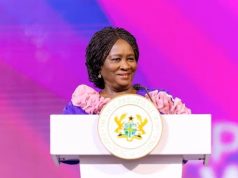Mustapha Gbande, Deputy Director of Operations at Ghana’s Presidency and Deputy General Secretary of the National Democratic Congress (NDC), has sharply criticized the previous administration under President Nana Akufo-Addo, alleging it bequeathed a legacy of leadership failures and entrenched corruption.
Speaking on Hot Issues on TV3 on April 20, 2025, Gbande asserted that President John Mahama’s government inherited systemic challenges requiring urgent reforms.
“The foundation we have is a deficit of leadership and credibility, criminal activities, and corruption. That is what we met and that is what we want to clean up,” Gbande stated, emphasizing the Mahama administration’s commitment to addressing governance gaps. He claimed security agencies under the current government have intensified efforts to combat crimes such as money laundering, cocaine trafficking, and cybercrime issues he argued were overlooked or concealed during Akufo-Addo’s tenure.
“In 100 days [since taking office], you are seeing crimes exposed that you never saw in the last eight years,” Gbande declared. “From politically incentivized crimes to cocaine activities, these were happening under the previous government, but citizens weren’t informed. Today, we are clamping down.” His remarks implied that the prior administration tolerated illicit activities, though he provided no direct evidence to substantiate the allegations.
The NDC, which regained power in January 2025 after four years in opposition, has positioned itself as a corrective force against graft and institutional decay. Gbande’s comments reflect broader political tensions in Ghana, where successive governments have traded accusations of corruption. Critics, however, argue such claims often serve partisan agendas, particularly during early tenure “honeymoon” phases.
Analysts note that Ghana’s political landscape remains polarized, with anti-corruption pledges frequently overshadowed by entrenched patronage systems. While Mahama’s administration has vowed transparency, skepticism persists given unresolved scandals from his prior presidency (2012–2016). The government’s ability to prosecute high-profile cases or recover assets linked to past regimes may prove pivotal in validating its rhetoric.
Gbande’s statements coincide with rising public demand for accountability amid economic strains. As Ghana navigates debt restructuring and inflation challenges, the Mahama administration faces pressure to demonstrate tangible progress beyond political critiques a balancing act that will test its credibility and the NDC’s long-term electoral prospects.
Send your news stories to newsghana101@gmail.com
Follow News Ghana on Google News
















